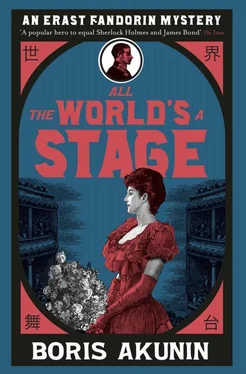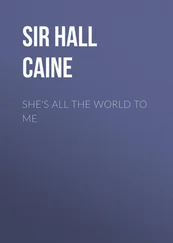‘How’s that, no servants? What about me?’
But he didn’t get up off his seat. In the end, of course, the ever-dependable Vasya Gullibin went.
What a bore , thought Eliza, suppressing a yawn. Mephistov’s right. This way the mood for acting will evaporate completely.
She took a little mirror out of her reticule and started practising the facial expressions of her character: innocent joy, touching agitation, tender affection, slight fright. Everything girlish and gentle, in pastel tones.
Stern was scolding Nonarikin for something. Kostya Shiftsky was making Serafima laugh, Vulpinova was bickering shrilly with Reginina.
‘Ladies and gentlemen… Noah Noaevich!’
Vasya was standing by the wing of the stage. His voice trembled and broke. Everyone turned round and the noise faded away.
‘Did you find Emeraldov?’ Stern asked angrily.
‘Yes…’ Gullibin’s lips started trembling.
‘Well, where is he, then?’
‘In his dressing room… I think he’s… dead.’
‘Don’t talk nonsense!’
Noah Noaevich went dashing backstage, with the others following behind him. The little mirror jolted and bounced in Eliza’s hands. At that moment she wasn’t really thinking anything, she was simply stunned and followed the others.
They were all frightened, disoriented, bewildered. Although it was clear at first glance that Hippolyte was dead (he was lying on the floor, on his back, with one twisted hand thrust up into the air), someone tried to lift him up and blow into his mouth and someone else shouted ‘Doctor! Doctor!’
Eventually Noah Noaevich shouted:
‘What are you doing? Can’t you see that he’s already cold? Everybody get back! Nonarikin, telephone the police. They must have their own doctor… What’s that they’re called? A coroner.’
Eliza cried, of course. She felt terribly sorry for Emeraldov, who had been so impossibly handsome in life, lying there now on the floor with his face contorted; one of his trouser legs was hitched up, but Hippolyte didn’t care.
They stood there, huddling in the doorway, waiting for the police. Reginina recited a prayer with solemn feeling. Aphrodisina sobbed, Mephistov and Vulpinova discussed in whispers who the dead man could have spent the night with. Sensiblin sighed: ‘This is what all the womanising and drinking got him, the pitiful playboy. But I warned him.’ Unable to stand around doing nothing, Nonarikin tried to tidy things up; he righted a chair that had been knocked over and picked up a tin goblet (a stage prop from Hamlet ). ‘Now where do I get a Lopakhin?’ Noah Noaevich asked, but it wasn’t clear whom he was asking.
Eventually a police officer and a doctor arrived, asked everyone to go out and closed the door. The examination of the body took a long time. With the exception of Noah Noaevich, the men went to the buffet to drink to the memory of the newly departed. The first reporter showed up – God only knew where he had sniffed out the news of the tragedy. And then another one arrived, and another. Photographers appeared too.
Eliza immediately went to her own room (her contract, like Emeraldov’s, entitled her to a private dressing room). She sat down in front of the mirror, wondering how to dress for the send-off. The funeral would be in St Petersburg, not here – Hippolyte had a wife, who hated the theatre and everything connected with it. Now her fickle husband would finally return to her and she would consign him to the ground as she saw fit.
Eliza tried out various shades of grief on her face.
Then someone started making a noise in the corridor; she heard footsteps and agitated voices and someone even shrieked. Eliza realised that the police had finished and it was time to go out to the press. She got up and threw on her feather boa from The Three Sisters – the line and colour were appropriately funereal. She set her eyebrows at a mournful angle and turned down the corners of her mouth. Her forehead and cheeks were pale, for quite natural reasons. And at the thought of poor Hippolyte her eyes immediately turned moist; in the photographs they would glisten. What terrible misfortune, how ghastly, Eliza told herself, working up her mood.
But this wasn’t the really ghastly part yet. That began when Zoya Comedina’s little freckled face was thrust in at the door.
‘Can you imagine, Eliza? The doctor says that Emeraldov killed himself. And out of unrequited love too! Now who could have expected that, from Emeraldov of all people! The reporters have gone plain crazy!’
And she went dashing on with the astounding news.
But Eliza recalled the entrepreneur Furshtatsky. And something else as well – only now, at this very moment.
When Hamlet-Emeraldov pinched Ophelia and some people in the theatre gasped and others guffawed, Eliza had noticed out of the corner of her eye that someone in a black frock coat jumped abruptly to his feet and walked towards the exit. At the time she was baffled and bewildered and she didn’t look more closely, but now that picture appeared in front of her eyes as clearly as if it were a photograph. Eliza’s glance possessed a quality that is important for an actress: it registered every detail in her memory.
The man who walked out of the auditorium had square shoulders, a twitchy stride and a gleaming bald patch. It was Genghis Khan, quite definitely – she had no doubt about that now.
Eliza suppressed her scream and grabbed hold of the table to prevent herself from falling. But she fell anyway. Her legs buckled as if they were made of limp rags.
Hippolyte Emeraldov’s send-off was managed by Noah Noaevich in person, and he treated this sad event like a theatrical production.
It made an impressive spectacle. The coffin was carried out through the entrance of the theatre with all due honours, to applause and keening from an entire choir of inconsolable female mourners – the leading man’s bereft admirers. The square was crowded with people. The procession, extending to well over half a mile in length, travelled halfway across the city to the Nikolaevsky railway station.
Eliza walked immediately behind the hearse with her head lowered and not looking around. She wore a veil, which she occasionally raised to wipe away her tears.
The state of terror and panic that had gripped her since the moment when she guessed the true cause of Hippolyte’s death had released her for the present. Eliza sensed people’s eyes on her and she was completely in character. The dead man, clad in the costume of Cyrano de Bergerac (that was his most famous role), except for the false nose, was transported in an open coffin, and it was not hard to imagine herself as Roxana seeing her prematurely deceased hero off on his final journey.
Before the train departed, Stern delivered a magnificent speech that set the women in the crowd sobbing, some of them hysterically.
‘A great actor has left us, an enigma of a man who carries away with him the secret of his death. Goodbye, friend! Goodbye, most talented of my pupils! Oh, how luminously you lived! Oh, how darkly you have departed! From light through darkness to an even more radiant Light!’
Eliza was also supposed to say some farewell words, as the deceased’s partner, but after Stern’s airs and graces, she didn’t want to appear like a fool, so she flung one hand up to her throat as if trying to force the lump of grief through it. Failing, she wilted and simply dropped a white lily into the coffin without speaking.
That seemed to have gone quite well. What is so good about a veil? You can examine faces through it and no one will notice. So that was what Eliza did. Oh, how they were looking at her! With tears, with admiration, with adoration.
Suddenly her attention was caught by a raised hand in a snow-white glove. It clenched into a fist and the thumb turned downwards in the gesture used to condemn a conquered gladiator to death. Eliza shuddered and shifted her gaze from the glove to the face – and everything was suddenly veiled in mist. It was him, Genghis Khan. Baring his teeth triumphantly in a smile of vengeance.
Читать дальше









